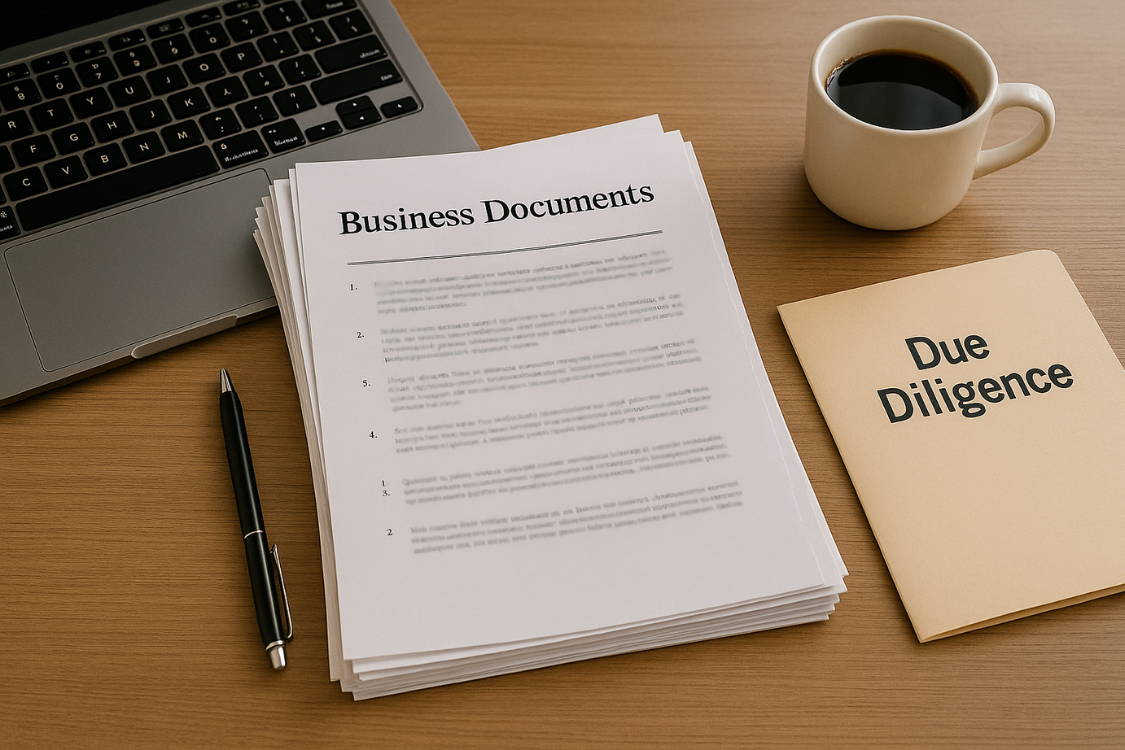The average time to sell a small business is often longer than many owners expect. While some hope for a quick sale, delays commonly arise during the selling process, especially when financial records, buyer financing, and due diligence aren’t ready.
The average timeline typically ranges from 7 to 10 months, depending on business value, buyer type, and market conditions. A rushed process can lower the final sale price or cause deals to fall through, especially if the business isn’t properly prepared.
This guide explains what affects the time-to-close, what often causes delays, and how business owners can keep the process moving with the right preparation and support.
Understanding the Time-to-Close Metric
Most small business sales take months to complete, not weeks. The average time to sell a small business includes multiple phases in the sale process, and each step brings its own delays if not managed well.
A business sale doesn’t close when it’s listed. It closes when a signed contract and funds are exchanged. Understanding where time is lost helps business owners plan ahead, choose the right business broker, and avoid costly setbacks.
What “time-to-close” really means
Time-to-close refers to the full stretch from listing a business to finalizing the deal. This includes the marketing process, reaching out to potential buyers, handling negotiations, conducting due diligence, and working with legal professionals to close. The timeline can stretch longer depending on business valuation, the type of buyer involved, or gaps in key business documents.
Difference between listing date and signed contract
The listing date marks when a business is first marketed to interested buyers. A signed purchase agreement usually comes months later, once a suitable buyer is found and the diligence process is complete. Some business owners sell faster if their pricing is realistic, but others, especially when the business falls into a niche category, take more time to secure the right buyer.
Typical phases within a business sale timeline
Selling a business typically follows a multi-phase structure: starting with business valuation, then moving into listing, marketing outreach, buyer engagement, offer review, the due diligence process, and closing.
At each step, business sellers must provide accurate financial records, respond promptly to questions from potential buyers, and adjust expectations based on professional advice. These actions help maintain momentum and build buyer confidence.
This extended timeline is common in B2B sales settings, where negotiations are often long and highly detailed, sometimes lasting six to twelve months depending on deal complexity, buyer involvement, and payment structures. Delays often occur when tax returns are incomplete, the selling price lacks supporting data, or sellers are underprepared for buyer meetings or the auction process.

Ask: “What’s Your Average Time-to-Close for Deals Like Mine?”
This is one of the most important questions you can ask a business broker. Their answer tells you how well they understand the sales process and whether they can guide you toward a successful transaction.
Experienced brokers often reference past deals to give time estimates you can trust. They can break the timeline into phases, helping you understand what to expect at each stage and how to keep things moving.
Why is this a key question to ask brokers
A broker’s average time-to-close shows how they manage the sale process, handle negotiations, and attract potential buyers. If they avoid the question or give vague answers, that’s a red flag. Brokers working with strategic buyers, private equity firms, or individual buyers should be able to explain how timelines shift based on the deal size, financing availability, and industry.
What should a detailed answer include
A business broker who understands how to sell a business should break down the full timeline and explain what can speed up or slow down the sale process. Their answer should cover key stages, buyer types, and how factors like financial records and business valuation impact the path to a successful sale.
Here’s what a detailed answer should include:
- How long does the due diligence process usually take for your business type
- The typical timeline for finding interested buyers or suitable buyers
- Expected timeframes for offer review, negotiation, and final purchase price agreement
- How they use a virtual data room to streamline document sharing and buyer screening
- The role of clean financial statements, tax returns, and accurate business valuation in avoiding delays
- Any differences in timing when dealing with private equity firms, search funds, or individual buyers
- How do they coordinate with legal professionals to prevent closing issues
These details show how prepared the broker is and whether they can help you sell your business with the least amount of friction.
How timelines differ by business type and market
Some industries generally sell faster than others. Healthcare practitioners, tech firms, and essential services may attract more interest. In contrast, businesses with seasonality, low annual revenue, or a narrow customer base often take longer. Business brokers familiar with your industry should adjust their timeline based on how your business operates and current market trends.

What’s Normal? Industry Averages for Small Business Sales
Small businesses typically take 7 to 10 months to sell. This includes the full sale process from listing to closing.
Timeframes can shift depending on market demand, business size, and the quality of your preparation. Business sellers should expect variation, but most sales fall within a predictable range.
Typical timeframes: 7–10 months total
On average, small business owners can expect a full sales cycle to last 7 to 10 months. This estimate includes everything from initial valuation to a signed contract and fund transfer. Lower-priced businesses and those with clean financial records may close faster, while complex deals or unclear asking prices can extend the timeline.
How does 3–4 months of that go to due diligence
Due diligence tends to be the slowest phase in most business sales. Buyers review tax returns, cash flow reports, business documents, and customer data. Delays here usually come from missing or disorganized records, unclear financial statements, or poor communication between parties.
Exceptions and edge cases that take longer or shorter
Some businesses sell quickly, especially when they have a realistic asking price, clear financials, and strong buyer interest. Others may linger for over a year if the valuation is off, the market is slow, or the seller targets only one buyer group. Businesses with weak documentation or unclear business value often fail to attract qualified buyers in time.
Factors That Influence the Sales Timeline
No two businesses follow the same sales path. Several key considerations can speed up or slow down the selling process.
Knowing which steps cause delays lets you plan for them and avoid surprises during the sale.
Industry and deal size
Businesses in high-demand industries like healthcare or B2B services generally sell faster, especially when there is time-sensitive demand or strong operational efficiency. In B2B settings, complex pricing strategies, delivery lead times, and multi-stakeholder decision-making all influence how quickly a business can move through the sale process.
Deal size also matters. Larger businesses with higher annual revenue and a solid management team tend to attract private equity groups, who often conduct more detailed reviews that extend the timeline. Meanwhile, lower-value deals may close faster but usually draw individual buyers who require more support and flexibility.
These differences often come down to temporal preferences (how urgently a buyer or seller wants the deal to close) and operational constraints, such as the company’s ability to deliver services or manage transitions within tight deadlines. Together, these factors shape both the speed and structure of a business sale and reflect patterns seen in capacity-constrained B2B pricing systems.
Buyer financing and negotiation delays
Financing availability plays a big role in how fast a deal moves. Strategic buyers or family offices may have funds ready, while individual buyers often need loans. Negotiations can also stall when sellers set an asking price far above the business’s worth, or when both parties can’t agree on deal structure or transition terms.
Seasonality and market conditions
Many business owners don’t realize that timing affects buyer interest. Businesses generally sell faster in spring and fall, when more buyers are active in the market. In contrast, slower periods like year-end holidays or tax season can stall outreach efforts and reduce visibility during the marketing process.
These seasonal shifts often align with broader business cycles, which follow a wavelike pattern of expansion and contraction. During times of economic revival or growth, buyer activity tends to rise, fueling faster sales. In periods of recession or uncertainty, the pace of the selling process may slow as both strategic buyers and individual buyers delay decisions or adjust pricing expectations.

Signs of Unrealistic Broker Promises
Fast-closing guarantees often lead to disappointment. Business owners should watch for brokers who promise quick sales without backing it up.
A successful sale depends on the business valuation, buyer fit, and the due diligence process, not just how fast the listing goes live.
Red flags in “fast closing” claims
Quick-sale promises can sound appealing, but they often overlook the real complexity involved in the sale process. Business sellers should watch for these red flags when a business broker claims they can sell your business quickly without understanding key details like business valuation or financial records:
- No review of your financial statements, cash flow, or tax returns before quoting a timeline
- Guarantees of a quick sale without understanding how your business operates or what makes it valuable
- Claims that ignore the need for a realistic asking price or proper business valuation
- No plan to qualify potential buyers or assess if they’re a suitable buyer
- No mention of the due diligence process or required input from legal professionals
- Vague comments about buyer interest with no breakdown of outreach strategy or auction process
- Dismissal of industry-specific timelines that affect when and how you can sell a business
These signs often point to brokers who overpromise and underdeliver, leaving business owners frustrated and behind schedule.
How to verify a broker’s actual performance
Many business owners rely on a broker’s word without checking their actual results. To avoid delays or costly mistakes, verify the broker’s experience using real data and past performance. A reliable business broker should be able to demonstrate how they’ve helped others sell a business successfully.
Here’s how to verify a broker’s actual performance:
- Ask for examples of recently sold businesses, including sale price, purchase price, and average time-to-close
- Request details on past deals involving strategic buyers, financial buyers, or private equity firms
- Use a Broker Red Flag Detector or Referral Scorecard to compare brokers based on hard data
- Check if they’ve sold businesses in your industry or ones with similar business value and size
- Ask for references from clients with deals like yours, and confirm if the sale process was smooth
- Review how they qualify an interested buyer, and if they’ve worked with suitable buyers before
- Confirm that their marketing process includes real outreach, not just listing and waiting for leads
When brokers share their past deal outcomes, it becomes easier to judge who can actually close a deal like yours.
Why transparency on timing shows broker reliability
Honest brokers break down how long each part of the sale process takes. They should explain the typical delays in the diligence process, what slows down offers from potential buyers, and what causes a deal to fall apart. Transparency shows that the broker understands the market and knows how to guide small business owners through a realistic timeline.

How You Can Help Speed Things Up
You can’t control the buyer, but you can control your readiness. The AA clean process may help your business move faster and keep serious buyers engaged.
Quick responses and early prep often mean fewer delays and better buyer engagement.
Preparing clean financials and documents
Start with accurate financial statements, updated tax returns, and organized business documents. Buyers, especially financial buyers and private equity groups, want to see a full picture of business value before moving forward. Uploading everything to a virtual data room saves time during the due diligence process and builds trust with qualified buyers.
Responding quickly to buyer requests
Delays often happen when sellers go silent. Business sellers who answer buyer questions fast and provide updated numbers keep the momentum going. Slow replies give the impression that something is missing or wrong with the business’s worth or cash flow.
Setting clear expectations with your broker
Make sure your broker knows your exit strategy, target sale price, and acceptable deal terms. Discuss what a realistic asking price looks like based on your valuation process. Talk through how the broker will vet interested parties, run the marketing process, and guide negotiations to the best price and total sale price possible.
How Long It Takes Depends on How Well You Prepare
The average time to sell a small business is 7 to 10 months, with due diligence and buyer vetting making up a large part of the process. Timelines vary based on business value, industry, buyer type, and how organized your financial records are.
Many business owners lose time and money when they fail to prepare or hire a business broker who lacks experience. Disorganized documents, unclear pricing, and slow responses can cause the deal to stall or fall through.
A strong marketing process, clean financial statements, and clear expectations help you attract qualified buyers and move toward a faster, more successful transaction. If you plan early, you’ll likely move through the process faster and avoid selling for less than you should.
Frequently Asked Questions
How long does it usually take to sell a small business?
The average time to sell a small business is 7 to 10 months, depending on business value, buyer type, and deal complexity.
What delays the closing of a business sale?
Common delays in the selling process include incomplete financial records, slow buyer financing, and gaps in due diligence.
Is it possible to sell a business in under 6 months?
Yes, but most businesses only sell that quickly if they have a fair asking price, clean financials, and a qualified buyer ready.
What is due diligence, and how long does it take?
Due diligence is the buyer’s review of financial statements, tax returns, and operations, usually lasting 3 to 4 months.
Can seasonality affect the speed of a business sale?
Yes, small businesses generally sell faster in spring or fall when more prospective buyers are active in the market.
References
- Ghasemzadeh, F., & Ghahremannasab, B. (n.d.). A queuing approach to pricing strategy in B2B markets. Department of Management and Accounting, University of Zanjan. Retrieved from https://d1wqtxts1xzle7.cloudfront.net/121967002/A_Queuing_Approach_to_Pricing_Strategy_in_B2B_Markets-libre.pdf
- Grönlund, H. (2018). Closing the deal in a business-to-business sales process [Bachelor’s thesis, Degree Programme in Business Management and Entrepreneurship]. Theseus. https://www.theseus.fi/bitstream/handle/10024/146064/GronlundHenrik.pdf
- Mitchell, W. C. (2005). Business cycles. In Business cycle theory, part II (Vol. 8, 1st ed., pp. 17). Routledge. https://www.taylorfrancis.com/chapters/edit/10.4324/9781003549758-13/business-cycles-wesley-mitchell



